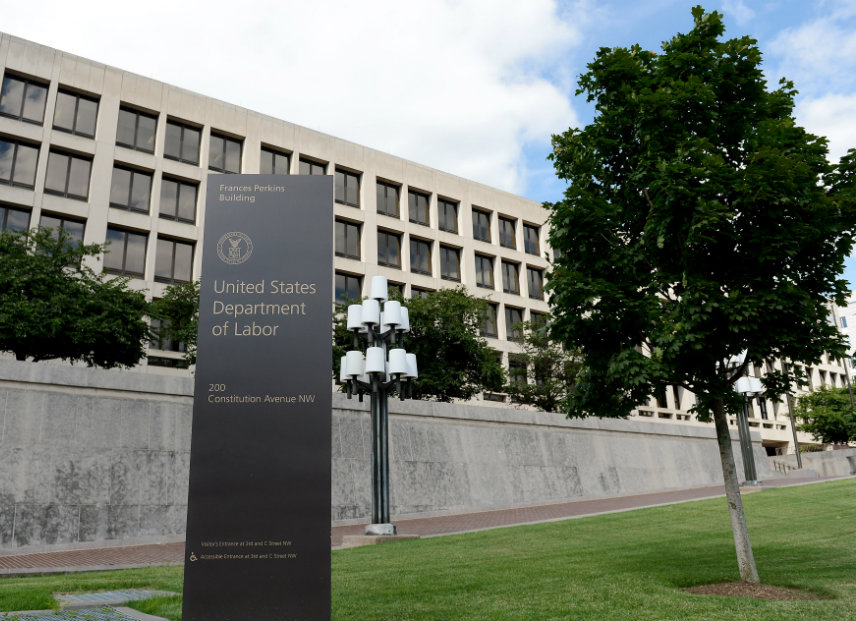Trump Can Gut Obama-Era Labor Regs Because They Were Never Meant to Last
Unofficial regulations and "guidance documents" passed without any public comment are no way to go about regulating an economy.

Eliminating a set of Obama administration rules for independent contractors and businesses that operate as franchises took U.S. Labor Secretary Alexander Acosta only three sentences.
That's because those rules were passed in a way that practically invited their disposal by any future Republican administration.
Business groups welcomed the change. The Obama-era rules were potentially devastating for some small businesses and entrepreneuers and left bigger businesses on the hook for greater liability in future labor law disputes.
The change also serves as another sign the Trump administration is interested in rolling back rules that largely for political reasons to appease unions unnecessarily locked workers into less flexible employment relationships.
In a broader sense, last week's repeal of the so-called "independent contractor and joint employer rules" is a good example of why organizing an economy by executive fiat creates problematic uncertainty for employers and workers.
During the Obama administration, there was significant growth in what some observers call "regulatory dark matter." The phrase itself was coined—to my knowledge, at least—by Clyde Wayne Crews, a vice president at the Competitive Enterprise Institute and probably the most knowledgeable person in the country when it comes to the actual size and scope of the federal regulatory state. These pieces of "dark matter" are rules that, like their cosmic namesakes, can't really be seen or measured. They don't really exist, at least not in the traditional sense, but we can still see the effect that they have.
"Guidance documents," Crews' CEI colleague Ryan Young wrote in 2015, are an "increasingly popular form of dark matter." They are the result of regulations that are unclear, which might create a legal question about how they should be applied. When a court raises that question, the regulatory agency can responds with a "guidance" explaining to the judge how he or she should proceed. Judges can't be experts in all the technical details of government regulations, so they will often defer to the guidance provided by the very regulatory bodies whose rules are subject to a legal challenge.
"Agencies know this," Young points out, "and will take advantage of it to sneak through regulatory requirements without having to put them before the public."
Two of those guidance documents—one issued in July 2015 and another in January 2016—rewrote the federal government's interpretation of who counts as an employee and who counts as an independent contractor. "Most workers are employees" the Department of Labor concluded in the first of those two guidance documents. Employers who relied on independent contractors could still be held liable under a variety of labor laws if they did not treat their contractors to employee benefits like overtime pay (which was one of the major issues at stake in the fight).
The point of the rule change was to make larger companies legally liable for labor law violations committed by smaller companies that operated as outside contractors. In reality, as Ohio-based labor lawyer Jon Hyman noted at the time, it could be "the end of staffing agencies and franchises as viable business models." Other observers, like Beth Milito, a senior legal counsel for the National Federation of Independent Businesses, warned that it would "make it much harder for self-employed subcontractors to get jobs."
Of course, Jim Hoffa, president of the Teamsters Union, called the ruling a "victory for workers across America."
This was a classic labor-management fight, and the Obama administration came down clearly on the side of labor—though certainly not on the side of independent, non-unionized contractors. Now, the Trump administration has reversed that ruling with that three sentence statement issued last week by Labor Secretary Alexander Acosta.
Why does this matter? Well, if you're one of the groups with a stake in the fight, it obviously matters quite a bit. For the rest of us, though, there's still an important lesson here about the proper way to regulate an economy.
The use of "guidance documents" and other forms of unofficial but-we-still-expect-you-to-do-this-anyway rulemaking can shift enormous regulatory burdens seemingly overnight. Laws that go through the legislative process are subject to a public vetting process and are approved by democratically elected officials.
Regulations that go through the normal federal regulatory process are subject to less democratic accountability, but still go through mandatory public comment periods. None of that happens for "dark matter" rules like guidance documents, which allow major policy changes to be implemented with little warning to the affected businesses and individuals.
There's another lesson for anyone—in this case, labor unions—that pushed for the new interpretations from the Obama administration. Unlike what would have happened if those rules had been written as legislation or in official regulations, this supposedly major "victory for workers" was wiped away with a three sentence press release.
If unions believed those rules would stick around past the end of the Obama's term, they were either too arrogant to believe Democrats could lose the White House in the near future or too myopic to realize that such anti-business rules would never survive a Republican-appointed labor secretary.
New policies that affect wide swaths of the economy and reshape entire business models should go through Congress, or at the very least should be subject to the public rulemaking process. Guidance documents and other "dark matter" regulations that by-pass those processes can be un-made as quickly as they were made, leaving businesses to deal with an ever-changing and unpredictable regulatory state that does not really help anyone, no matter which side you're on in any individual policy fight.
